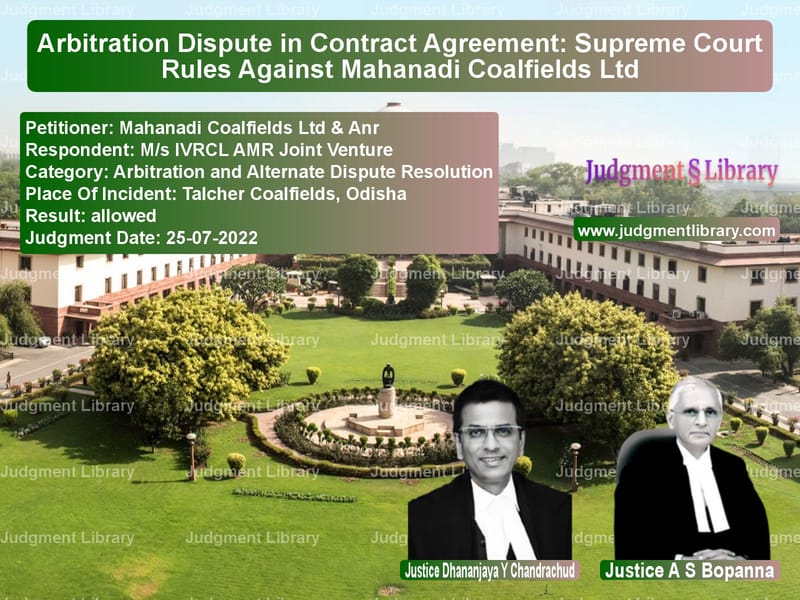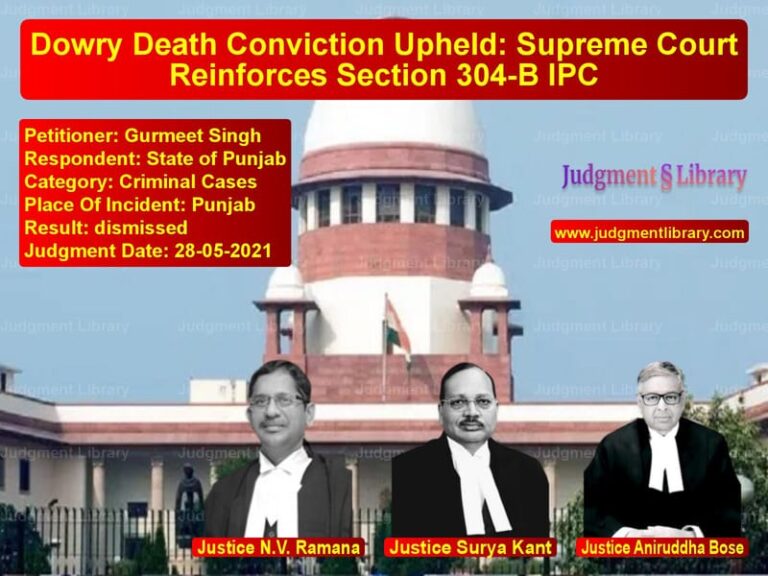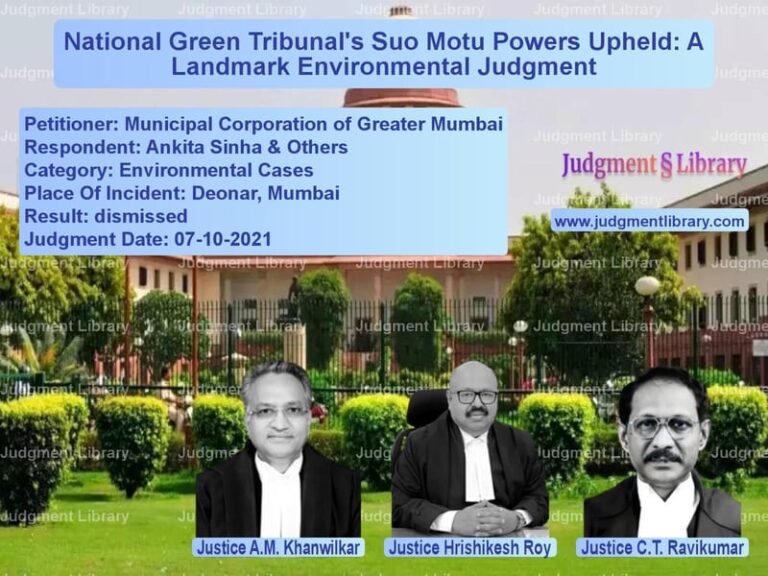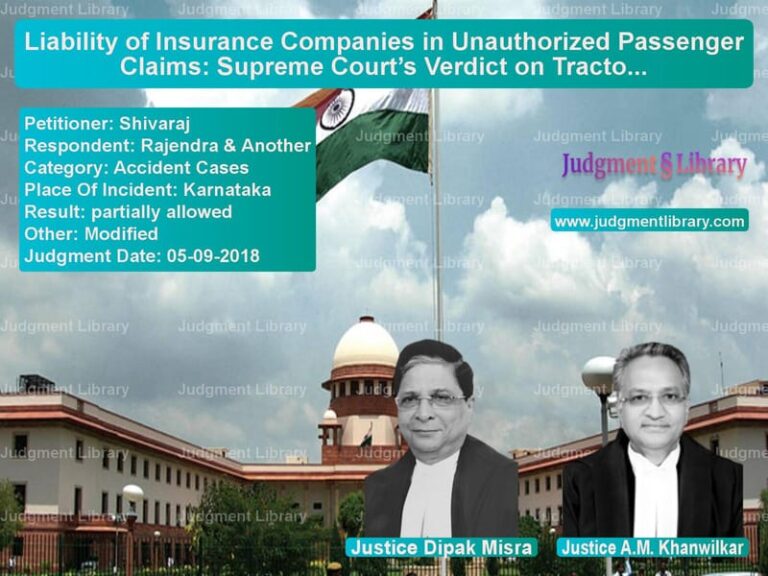Arbitration Dispute in Contract Agreement: Supreme Court Rules Against Mahanadi Coalfields Ltd
The case of Mahanadi Coalfields Ltd & Anr vs. M/s IVRCL AMR Joint Venture revolves around a dispute over an infrastructure contract, specifically the strengthening and widening of a coal transportation road at the Talcher Coalfields in Odisha. The key legal question in this case was whether an arbitration agreement existed between the parties, allowing for dispute resolution through arbitration.
The Supreme Court, in its judgment delivered by Dr. Dhananjaya Y Chandrachud and A S Bopanna, ruled that the contract agreement did not constitute a valid arbitration agreement under the Arbitration and Conciliation Act, 1996. As a result, the Court set aside the High Court’s order appointing an arbitrator and ruled that Mahanadi Coalfields Ltd was not obliged to resolve the dispute through arbitration.
Background of the Dispute
The case arose from a contract between Mahanadi Coalfields Ltd (a subsidiary of Coal India Limited) and IVRCL AMR Joint Venture (a consortium of engineering contractors). The sequence of events was as follows:
- On 11 October 2010, Mahanadi Coalfields Ltd issued an e-tender for the construction project.
- The contract was awarded to IVRCL AMR Joint Venture on 14 December 2011.
- A formal contract agreement was signed on 30 January 2012, setting the work period from 16 January 2012 to 14 January 2015.
- The contractor was repeatedly asked to expedite work but failed to meet the deadlines.
- The contract was terminated on 15 May 2014 due to the contractor’s failure to adhere to the work schedule.
Contractor’s Claims and Legal Action
After the contract termination, IVRCL AMR Joint Venture filed a claim for Rs. 128.65 crore on 12 October 2017, citing delays caused by Mahanadi Coalfields Ltd. The claim was rejected on 18 December 2017. Following this rejection, the contractor issued a notice of arbitration under Clause 15 of the contract agreement, seeking the appointment of an arbitrator.
Mahanadi Coalfields Ltd did not respond to the arbitration notice, prompting the contractor to file an application under Section 11(6) of the Arbitration and Conciliation Act, 1996, before the High Court of Orissa. The High Court allowed the application and appointed a sole arbitrator on 29 November 2019.
Key Arguments in the Supreme Court
Arguments by Mahanadi Coalfields Ltd
The appellants, represented by the Attorney General of India, argued that Clause 15 of the contract agreement did not constitute a valid arbitration agreement. Their key contentions were:
- Clause 15 does not explicitly refer disputes to arbitration but only provides a mechanism for internal settlement at the company level.
- The clause does not mandate arbitration but instead states that disputes with government agencies shall be handled per Ministry of Finance guidelines, while disputes with private entities may be pursued in a court of law.
- The Arbitration and Conciliation Act, 1996, requires a clear and binding arbitration agreement, which was absent in this case.
Arguments by IVRCL AMR Joint Venture
The respondent’s legal counsel contended that:
- Clause 15 was titled “Settlement of Disputes/Arbitration,” indicating the intent for arbitration.
- Coal India Limited had issued a policy on 7 April 2017 allowing arbitration for work contract disputes.
- The High Court’s order was valid as it recognized an arbitration mechanism under the contract.
Supreme Court’s Judgment
The Supreme Court analyzed the contract agreement and previous judgments on arbitration clauses. It held:
“Clause 15 of the Contract Agreement is a dispute resolution mechanism at the company level, rather than an arbitration agreement.”
The Court applied the principles laid out in previous cases, including Jagdish Chander v. Ramesh Chander, to determine whether an arbitration agreement existed. The Court noted:
- A valid arbitration agreement must show an intention to submit disputes to arbitration and a willingness to be bound by the arbitrator’s decision.
- Mere use of the term “arbitration” in a contract does not constitute an arbitration agreement.
- Clause 15 lacked essential elements of an arbitration agreement as it did not make arbitration the exclusive mode of dispute resolution.
The Supreme Court ruled:
“There is no written agreement to refer either present or future disputes to arbitration. Neither does the substantive part of the clause refer to arbitration as the mode of settlement, nor does it provide for a reference of disputes between the parties to arbitration.”
Read also: https://judgmentlibrary.com/supreme-court-sentences-developer-for-contempt-in-real-estate-dispute/
Implications of the Judgment
The Supreme Court’s ruling clarifies that:
- Companies must ensure that arbitration clauses are clearly worded if they intend to resolve disputes through arbitration.
- Dispute resolution mechanisms within contracts should not be misinterpreted as arbitration agreements unless they meet the legal criteria under the Arbitration and Conciliation Act.
- Contractors and companies should explicitly agree on arbitration terms to avoid ambiguity.
Conclusion
The Supreme Court’s decision underscores the importance of clear contractual terms in arbitration agreements. The ruling prevents parties from compelling arbitration unless a valid agreement exists and ensures that companies are not forced into arbitration proceedings against their contractual terms.
This case serves as a significant precedent in contractual disputes, particularly in the construction and infrastructure sectors, reinforcing the principle that arbitration requires explicit and unambiguous consent from both parties.
Petitioner Name: Mahanadi Coalfields Ltd & Anr.Respondent Name: M/s IVRCL AMR Joint Venture.Judgment By: Justice Dhananjaya Y Chandrachud, Justice A S Bopanna.Place Of Incident: Talcher Coalfields, Odisha.Judgment Date: 25-07-2022.
Don’t miss out on the full details! Download the complete judgment in PDF format below and gain valuable insights instantly!
Download Judgment: mahanadi-coalfields-vs-ms-ivrcl-amr-joint-supreme-court-of-india-judgment-dated-25-07-2022.pdf
Directly Download Judgment: Directly download this Judgment
See all petitions in Arbitration Act
See all petitions in Contract Disputes
See all petitions in Commercial Arbitration
See all petitions in Dispute Resolution Mechanisms
See all petitions in Enforcement of Awards
See all petitions in Judgment by Dhananjaya Y Chandrachud
See all petitions in Judgment by A. S. Bopanna
See all petitions in allowed
See all petitions in supreme court of India judgments July 2022
See all petitions in 2022 judgments
See all posts in Arbitration and Alternate Dispute Resolution Category
See all allowed petitions in Arbitration and Alternate Dispute Resolution Category
See all Dismissed petitions in Arbitration and Alternate Dispute Resolution Category
See all partially allowed petitions in Arbitration and Alternate Dispute Resolution Category







